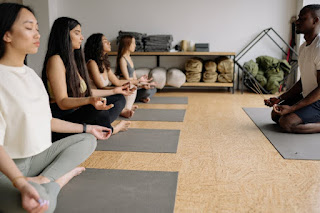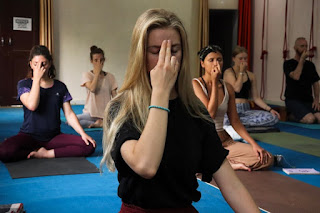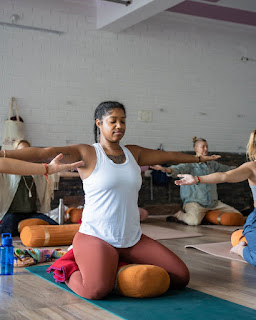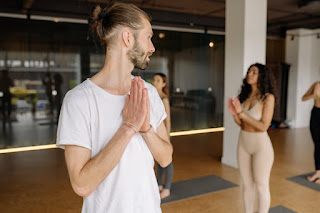Top Classes in Mindfulness Online – Updated [May 2024]
Whether you’re a beginner eager to explore mindfulness techniques or a seasoned practitioner looking to deepen your practice, the right course can make all the difference. Online platforms now offer a variety of mindfulness courses, providing flexibility and access to expert guidance from anywhere in the world. These courses also aim to improve mental clarity alongside flexibility and access. From formal mindfulness-based stress reduction (MBSR) programs to more casual taster sessions, there’s something available for everyone. In this guide, we’ll navigate through the top online mindfulness courses as of May 2024, helping you find the perfect match for your personal development journey. As we explore these options, we’ll also touch on Harmony Centered’s meditation course, illustrating how it aligns with broader mindfulness training opportunities.

Formal mindfulness courses (MBCT and MBSR)
When considering a formal approach to mindfulness, two internationally recognized programs stand out: Mindfulness-Based Cognitive Therapy (MBCT) and Mindfulness-Based Stress Reduction (MBSR). Both programs are meticulously structured to help individuals cultivate mental resilience and manage stress through mindfulness techniques.
Mindfulness-Based Cognitive Therapy (MBCT)MBCT combines traditional cognitive behavioral therapy with mindfulness strategies. Initially developed to prevent relapse in individuals suffering from recurring depression, MBCT has proven beneficial for a broader audience, aiming to better handle emotional challenges by altering habitual responses. MBCT courses typically span 8 weeks and involve weekly group sessions guided by certified trainers.
Mindfulness-Based Stress Reduction (MBSR)MBSR, the brainchild of Dr. Jon Kabat-Zinn at the University of Massachusetts Medical School, focuses on reducing stress and enhancing emotional and physical well-being through mindfulness meditation. This 8-week program includes practices such as body scanning, yoga, and daily mindfulness meditation, with mindful meditation being a core practice for promoting mental well-being. It has been widely adopted in various healthcare settings and is suitable for anyone looking to improve their overall stress management skills.
Both MBCT and MBSR courses can be found through several online platforms that provide interactive sessions with qualified instructors. Participants are encouraged to engage in daily practice and weekly group discussions, fostering a supportive community environment. These structured courses offer a comprehensive introduction to the practice of mindfulness, making them ideal for individuals seeking guided training with a clear framework.
For those exploring online mindfulness courses, it’s beneficial to consider the credentials of the course providers. Courses offered by established institutions or recognized mindfulness centers, such as Harmony Centered, often provide additional resources such as access to a wider community, ongoing support, and continuity in personal practice.

How to find introductory courses, taster sessions and groups
Embarking on your mindfulness journey begins with finding the right introductory course or taster session. These initial experiences are crucial as they set the foundation for your understanding and practice of mindfulness. Here are some key steps and considerations for selecting the best introductory mindfulness courses:
Exploring Options Online
The digital age has made it easier than ever to access a wide range of mindfulness courses. Many platforms offer introductory sessions that can range from a single class to a series of classes over a few weeks. Look for options that include elements like body scans and basic mindfulness meditations, which are essential for developing self-awareness and emotional intelligence.
Attending Taster Sessions
Taster sessions provide a snapshot of what a full mindfulness course will entail and are usually offered for free or at a low cost. These sessions are a great opportunity to experience the teaching style of the instructor and the course content. They also often include Q&A segments to help clarify any doubts about the practices and outcomes.
Joining Groups
Joining a group, whether online or in person, can enhance your learning experience. Groups offer a sense of community and support that is invaluable, especially when starting out. They allow for shared experiences and discussions that can deepen your understanding of mindfulness practices.
Look for Accredited Programs
Ensure that the courses or sessions you choose are led by accredited or experienced instructors. Programs that run for approximately eight weeks, such as those offered by Harmony Centered, allow for a thorough engagement with mindfulness practices, making them an excellent choice for those committed to developing a consistent mindfulness practice.
By carefully selecting your initial mindfulness learning experience, you not only set yourself up for success but also ensure that your journey into mindfulness is both enlightening and rewarding.

Check your mindfulness teacher’s qualifications
The effectiveness of your mindfulness practice largely depends on the expertise and experience of your instructor. As the popularity of mindfulness grows, so does the number of people offering training. Here’s how you can ensure that your mindfulness teacher meets the necessary professional standards:
Certification and Training
Look for teachers who have formal training and certification in mindfulness-based programs. Certifications in MBCT (Mindfulness-Based Cognitive Therapy) or MBSR (Mindfulness-Based Stress Reduction) are particularly valuable as they require rigorous training and adherence to specific standards. Teachers should ideally have completed an eight-week course themselves and undergone additional training to teach it.
Experience and Specialization
Experience teaches nuances that formal education cannot. Instructors who have been practicing and teaching mindfulness for several years are likely to have a deeper understanding and practical knowledge. Additionally, some teachers may specialize in different areas, such as mindfulness for stress reduction, emotional intelligence, or even specific groups like children or businesses.
Personal Practice
A credible mindfulness teacher will maintain a consistent personal practice. This is essential, as it deepens their understanding and embodiment of the principles they teach. Instructors should be able to share insights from their own experiences, making the practice more relatable and grounded in real-life applications.
Feedback and References
Check reviews or ask for testimonials from previous students. Feedback can provide insights into the teacher’s style and effectiveness, helping you make a better-informed decision.
Ongoing Education
The best teachers continually update their knowledge and skills. Look for instructors who are involved in continuous learning and professional development. This commitment can often be seen in how they integrate new findings or techniques into their sessions.

One-to-one private sessions
One-to-one private mindfulness sessions offer a personalized approach to learning and practicing mindfulness, tailored specifically to your needs and goals. Here’s why you might consider engaging in private sessions and what benefits they can bring:
Customized Learning Experience
Private sessions are highly customizable, allowing the instructor to tailor the content, pace, and techniques according to your personal development goals, level of experience, and specific challenges. Whether you’re dealing with particular stressors, seeking to enhance your emotional intelligence, or interested in deepening your self-awareness, a personalized program can be designed to address these needs.
Flexible Scheduling
Unlike group courses that follow a set schedule, private sessions offer flexibility, making it easier to integrate mindfulness practice into your busy lifestyle. This flexibility can be particularly beneficial if you have irregular working hours or other commitments that make attending scheduled classes challenging.
Direct Feedback and Support
One-to-one sessions provide immediate feedback and guidance, allowing for adjustments in real-time based on how your body feels and responds during practices like body scans or mindfulness meditations. This direct interaction ensures that you are practicing correctly and effectively, maximizing the benefits of each session.
Deeper Relationship Building
A private setting fosters a closer, more trusting relationship between you and your instructor. This rapport can enhance your comfort level, making it easier to discuss personal issues and receive support tailored to your emotional and psychological needs.
Accelerated Progress
With focused attention and personalized adjustments, you can often achieve progress more quickly in private sessions than in group settings. The instructor’s ability to continuously adapt the program allows for more intensive development and quicker mastery of mindfulness techniques.
Private mindfulness sessions can be a valuable investment in your personal and professional development, providing a supportive and tailored learning environment that promotes faster and more profound growth.

What Is Mindfulness Based Stress Reduction (MBSR) Training?
Mindfulness-Based Stress Reduction (MBSR) is a structured program designed to help individuals manage stress and improve their overall well-being through mindfulness techniques. Developed by Dr. Jon Kabat-Zinn at the University of Massachusetts Medical School in the 1970s, MBSR has gained international acclaim and widespread implementation across various settings including hospitals, schools, and workplaces. Here’s an overview of what MBSR involves and its key components:
Program StructureMBSR is typically an eight-week program that includes weekly group sessions lasting 2.5 hours, plus one all-day session that usually occurs in the sixth week. This intensive program is designed to teach participants how to cultivate a mindful approach to life, focusing on the present moment without judgment.
Core PracticesThe training involves several core practices:
- Body Scans: Participants lie down and bring awareness to various parts of the body sequentially, enhancing body awareness and the connection between the mind and body.
- Mindfulness Meditation: Practices focusing on breath and body sensations to develop a steadier mind that can remain calm and focused.
- Gentle Yoga: Simple yoga exercises to improve flexibility and body awareness.
Educational ComponentsEach session includes teachings on stress theory, psychology, and the neuroscience behind mindfulness. Participants learn how mindfulness impacts the brain and how it can be used effectively to manage stress and emotional responses.
Group Dialogue and ExercisesAn essential part of MBSR is the group interaction, which allows participants to share their experiences and learn from each other. This peer support is integral to the learning process, providing different perspectives and fostering a community of mindfulness practitioners.
Daily HomeworkParticipants are expected to practice mindfulness for about 45 minutes per day outside of the weekly sessions. This homework helps integrate mindfulness into daily life, ensuring that the benefits of the training extend beyond the classroom setting.
Benefits of MBSRStudies have shown that MBSR can significantly reduce symptoms of stress, anxiety, and depression. Participants often report better sleep, greater relaxation, and improved self-awareness and emotional intelligence. By fostering greater awareness of the present moment, MBSR helps individuals engage more fully in their lives, improving overall quality of life and relationships. Specifically, MBSR training is designed to reduce stress, with participants reporting significant stress reduction benefits, highlighting its effectiveness in stress management and enhancing well-being.
Mindfulness-Based Stress Reduction training offers a comprehensive approach to stress management and personal growth, backed by decades of clinical research and testimonials from those who have experienced profound changes in their approach to life’s challenges.

How to find Buddhist mindfulness courses
Buddhist mindfulness courses provide insights into the spiritual and ethical dimensions of mindfulness, which are sometimes less emphasized in secular programs. These courses often focus on deepening self-awareness, compassion, and the interconnectedness of all beings, reflecting the original teachings of Buddhism. Here’s how you can find reputable Buddhist mindfulness courses:
Research Buddhist Centers and Temples
Start by looking for Buddhist centers and temples near you, as many offer courses in mindfulness meditation. These institutions often provide a range of classes, from introductory sessions to more intensive retreats, taught by experienced monks and lay teachers.
Online Platforms
Many Buddhist organizations have adapted to the digital age by offering online courses. These can be particularly useful if you do not live near a Buddhist center. Websites like Dharma Seed and Insight Meditation Society offer recordings, live classes, and workshops that cover various aspects of Buddhist teachings and mindfulness practice.
Retreats
Participating in a retreat is a profound way to deepen your practice. Buddhist mindfulness retreats can range from a weekend to several months and typically involve a combination of meditation, teachings, and community living. Retreats provide an immersive experience that can facilitate significant personal insights and spiritual growth.
Teacher Qualifications
When selecting a Buddhist mindfulness course, consider the qualifications of the teachers. Look for those who have spent significant time in study and meditation practice, ideally under the guidance of respected Buddhist teachers. Authenticity in practice and teaching is crucial in these traditions.
Community Recommendations
Engage with local or online communities to get recommendations. Existing practitioners can offer insights into what to expect and may help you navigate the options available. Personal testimonials are invaluable in assessing the quality and impact of Buddhist mindfulness courses.
Compatibility with Personal Beliefs
While Buddhist courses are deeply enriching, they often include religious elements. Assess your comfort level with these aspects and consider how they align with your personal beliefs and interests in mindfulness.
Exploring Buddhist mindfulness courses can provide a richer, more nuanced understanding of mindfulness, enhancing both your personal practice and understanding of its historical and cultural origins.

How to find self-guided resources
Self-guided mindfulness resources are ideal for those who prefer to learn at their own pace or may not have access to formal courses or instructors. Here’s how you can find quality self-guided resources for mindfulness practice:
Books and E-books
There are numerous books available that provide comprehensive guides to mindfulness practice. Titles like “Wherever You Go, There You Are” by Jon Kabat-Zinn and “The Miracle of Mindfulness” by Thich Nhat Hanh offer excellent introductions and practical advice for incorporating mindfulness into daily life. E-books can be particularly convenient as they are often more accessible and portable.
Mobile Apps
Mobile applications such as Headspace, Calm, and Insight Timer offer guided meditations, daily mindfulness practices, and educational content. These apps cater to a wide range of experience levels, from beginners to advanced practitioners, and many offer personalized pathways based on your goals and preferences.
Online Videos and Courses
Platforms like YouTube have a vast array of mindfulness meditation sessions available for free. Additionally, websites like Coursera and Udemy provide structured courses—some created by leading universities and mindfulness experts—that you can undertake at your own pace.
Audio Guides and Podcasts
Audio resources can be a great way to engage with mindfulness practice, especially for those who find visual media distracting. Podcasts like “The Daily Meditation Podcast” or “Mindful Minute” offer short and accessible sessions that you can listen to anywhere, anytime.
Printable Worksheets and Guides
Several websites offer printable mindfulness exercises and guided meditation scripts that you can use offline. These resources are especially useful if you wish to avoid screen time while practicing mindfulness.
By utilizing these self-guided resources, you can build a tailored mindfulness practice that fits your individual needs and lifestyle. These tools not only foster self-awareness and stress reduction but also empower you to integrate mindfulness seamlessly into your everyday life.

Course Support
Effective course support is essential for maximizing the benefits of any mindfulness training program. This support can vary widely depending on the format of the course—be it online, in-person, or self-guided. Here are key aspects of course support that can significantly enhance your learning and practice:
Access to Instructors
For formal courses like MBSR or MBCT, having direct access to instructors can make a significant difference. This support might include the ability to ask questions during or after sessions, receive personalized feedback, or even schedule one-on-one consultations. Such interactions can help clarify doubts, adjust practices to better suit individual needs, and provide motivation.
Community Forums
Many online courses offer community forums where participants can share experiences, challenges, and insights. These forums foster a sense of community and provide peer support, which is invaluable, especially when encountering difficulties or seeking encouragement. They can also be a source of diverse perspectives, enhancing one’s understanding and application of mindfulness.
Supplementary Materials
Additional resources such as reading materials, practice worksheets, and recorded meditations can support and enrich the main curriculum. These materials help reinforce learning, provide further insights into mindfulness, and offer practical tools for daily practice.
Technical Support
For online courses, reliable technical support is crucial. This ensures that all participants can easily access course materials and participate in sessions without interruptions, thereby maintaining a smooth and effective learning environment.
Follow-Up Sessions
Some courses offer follow-up sessions after the main program has ended. These sessions can help maintain the momentum of practice, address any new challenges that might have arisen, and refresh core concepts. They are particularly beneficial in solidifying the habits formed during the course.
Integration Tips for Daily Life
Practical advice on integrating mindfulness into daily routines can transform occasional practice into a consistent habit. Good course support includes providing participants with tips and strategies to weave mindfulness into everyday activities, from mindful eating to mindful walking.
By ensuring robust support throughout your mindfulness course, you can enhance your learning experience, maintain consistent practice, and truly integrate mindfulness into your life for lasting benefits.





